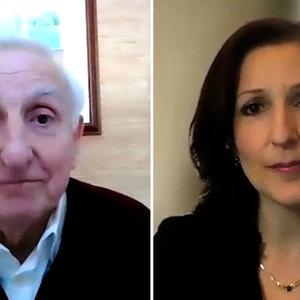The Know AML website uses a third-party service provided by Google that dynamically translates web content. Translations are machine generated, so may not be an exact or complete translation, and Know AML cannot guarantee the accuracy of translated content. Know AML and its employees will not be liable for any direct, indirect, or consequential damages (even if foreseeable) resulting from use of the Google Translate feature. For further support with Google Translate, visit Google Translate Help. The interviews webpage also uses YouTube, where subtitles and translations are generated automatically by AI; please be advised to exercise caution when precise interpretation is required. For further support with YouTube, visit YouTube Help.

Ralph and Gail’s story
Patient and Physician
April 1, 2021
Know AML is delighted to share a series of videos telling the story of Ralph Hills and Dr Gail Roboz. Ralph was diagnosed with acute myeloid leukemia in December 2014 and shortly after he met Dr Gail Roboz, a Professor of Medicine at Weill Cornell Medicine, New York, US.
Diagnosis, signs and symptoms, and initial steps
In this first video, they talk about Ralph's initial diagnosis, signs and symptoms of acute myeloid leukemia, and initial steps for patients who are embarking on their acute myeloid leukemia journey.
Treatment, side effects, and clinical trials
In this video, Ralph and Dr Roboz talk about the different treatment options for acute myeloid leukemia, including those that Ralph received, as well as any side effects he experienced along the way. Recent advances in the diagnosis and treatment of acute myeloid leukemia now play an important role in treatment decisions, and Ralph made the choice to take part in a clinical trial (a medical study involving people with the aim to optimize treatments for different diseases).
Support and follow-up
In this video, Ralph talks about his support network and how a number of factors have helped him through his acute myeloid leukemia journey. Dr Roboz outlines the need for routine follow-up of patients with acute myeloid leukemia in order to achieve the best possible long-term outcomes.
Remission, relapse, and COVID-19
In this video, they talk about what it means to be in 'remission' and what can happen if patients with acute myeloid leukemia 'relapse'. Dr Roboz concludes by highlighting the impact of the COVID-19 pandemic on the availability of treatment and care for patients with acute myeloid leukemia.
What did you think of this patient story? Let us know at ses_knowaml@scientificeducationsupport.com